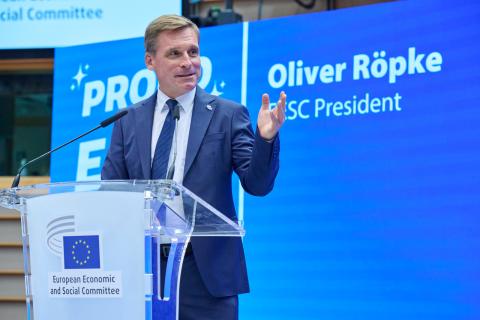European Economic
and Social Committee
EESC marks end of term of office with messages of unity, democracy and hope
At its September plenary in Brussels, the European Economic and Social Committee (EESC) brought together EU leaders, civil society, youth groups, and international partners in the European Parliament hemicycle to mark the end of President Oliver Röpke’s 2023-2025 term of office. The ceremony celebrated the Committee’s recent achievements and looked ahead to the challenges set to shape Europe’s future.
European Commissioner Maroš Šefčovič described today’s world as one of great upheaval, with geopolitical uncertainty and trade disruptions threatening millions of jobs. He emphasised the Committee’s role in shaping policy, stating: ‘The Protocol sees this Committee as the “house of European civil society”. We can clearly see the impact it is having and the contribution it is making to European policymaking. You advocate for a competitive Europe based on the EU’s social model and supported by the green transition, showing how civil society helps bring all these elements together.’
Youth at the heart of democracy
Youth voices were prominent throughout the day. European Youth Forum President Răres Voicu warned that extremism is already here, while EESC youth delegates pointed to the Youth Test as a concrete achievement of the past two years. They stressed that early involvement, ownership and mainstreaming youth concerns are essential to building a more democratic Europe.
Enlargement and candidate countries
Enlargement was another central theme. Albanian Prime Minister Edi Rama delivered one of the most powerful speeches, saying: ‘Europe’s strength lies in its people and in dialogue, not in arguing with its gods alone. Under your presidency, you converted me into a believer in social dialogue, and you ensured that our voices from the Western Balkans echoed here and were not just whispers. The EESC is the place where we Albanians, so often treated as second-class citizens of Europe, felt like equals. Europe thrives as a whole, and only as a whole.’
Speakers from Spain, Romania, Moldova, Ukraine, Türkiye and Serbia echoed the importance of giving candidate countries a genuine voice and standing together in defence of democracy.
Tributes and legacy
The ceremony also honoured long-serving members and reflected on President Röpke’s leadership. Dimitris Dimitriadis, closing a 26-year tenure, summed up the President's work as a ‘mission accomplished’. Other members warned of polarisation and authoritarianism, while colleagues such as Lucie Studničná, Séamus Boland and Stefano Mallia, hailed President Röpke’s legacy on youth participation and enlargement. Vice-Presidents Laurenţiu Plosceanu and Krzysztof Pater, together with Secretary-General Isabelle Le Galo Flores, highlighted the achievements of this term of office, which included stronger outreach and greater impact.
Concluding the ceremony after a video tribute, President Röpke expressed his heartfelt thanks to EESC staff: ‘Nothing we achieved would have been possible without our staff. From the interpreters to the technicians, from the administrators to the advisors, from the secretariat to the services, you are the backbone of this house. You make the machine run smoothly. You make ideas reality. You are the silent strength of the EESC. I thank you, sincerely, for your professionalism and your dedication. Colleagues, this is not my term of office. It was our term of office. Together, we were ambitious. Together, we delivered.’
He also urged the Committee to continue reinforcing democracy, supporting enlargement and keeping civil society at the heart of the European project. As Prime Minister Rama reminded participants, Europe’s strength lies in its people and its dialogue, not just in its institutions.
Additional quotes
European Parliament President Roberta Metsola
‘During your term of office, you have managed to steer the Committee forward through a time of great change for our Union, while at the same time making sure the important and complex daily work of the institution continues uninterrupted. We will continue to deepen the connection between our two institutions, ensuring that citizens and civil society remain at the center of everything we do.’
European Council President António Costa
‘Under your guidance, the EESC has strengthened its place as a central partner in the European Union's institutional architecture. You have given the Committee a stronger role and a clear voice as a true gateway for civil society, linking our institutions with citizens and with international partners.’
